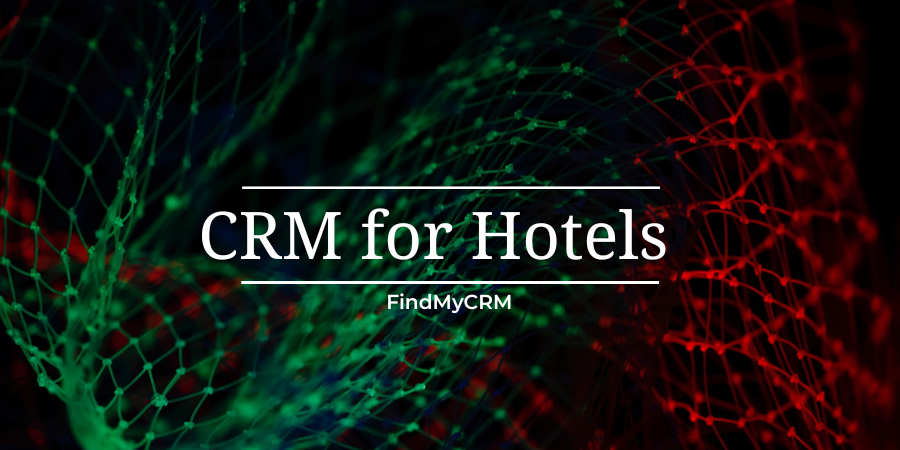What Is CRM in the Hospitality business?
CRM for hotels integrates seamlessly across the primary three departments: marketing, sales, and service. In typical point-of-sale businesses, the exchange primarily involves money for goods or services.
However, in the hotel industry, a crucial fourth department - operations - sits between sales and service. Once the booking process is completed and a customer transitions to being a welcomed guest, there are numerous unique requirements and considerations. This is where CRM for hotels plays a pivotal role, addressing those specific operational tasks.
Moreover, with the hospitality sector expanding rapidly yet also becoming increasingly competitive (consider disruptors like AirBnB challenging conventional hotel operations), CRM for hotels becomes even more essential.
CRM for hotels provides both large franchises and boutique hotels with enhanced marketing capabilities that surpass generic advertising strategies. By harnessing data, deploying automation, and implementing intelligent segmentation, CRM for hotels ensures marketing stands out with unmatched personalization from the initial customer interaction.
With the assistance of CRM for hotels, by the time a guest arrives, they are greeted with a tailored experience, laying the groundwork for five-star customer satisfaction.
Using monday sales CRM for the hospitality industry

5
monday sales CRM provides all the essential features you need from a customer relationship management system, along with bonus benefits that you may find helpful in running your hotel.
The hotel business is one of the most complex processes in terms of the number of processes that need to be managed. The owner of the hotel needs not only to monitor how well the staff does their job but also to interact with the guests, to see how satisfied the visitors are with the service. This is a fairly large amount of tasks, and the CRM system of hotels helps to cope with them.
Essential CRM for hotel customer relationship management helps companies meet the challenges of increasing customer loyalty and improving customer satisfaction. The hospitality industry is also profiting from the promotion of restaurants, spas, and other value-added services that help establish a place in the service market. With the help of CRM, you can organize advertising campaigns and make discounts for guests on certain services.
The success of hotels depends on how happy their guests feel, and feel comfortable and valued by employees. To do this, companies need to keep track of customer contact information and preferences in order to enhance the personalized experience during the stay. CRM collects and stores customer information so that when frequent visitors check-in, staff can greet them by name, offer complimentary snacks or drinks based on preference, and deliver them to their room as soon as possible. Delighting guests in this way will increase the quality of customer service and the chance of re-booking. CRM for hotels can help increase sales by emailing promotional offers to customers. In the line of almost ideal systems, today are...
Loyalty Program in CRM Software for the hospitality industry
A loyalty program in the CRM system for the hospitality industry is a strategic initiative designed to foster long-term relationships and repeat business from guests. It involves implementing a system within the Customer Relationship Management (CRM) software tailored specifically for hotels, restaurants, resorts, and other hospitality establishments.
Key elements of a loyalty program within hospitality CRM typically include:
- Points Accumulation: Guests earn points for every transaction or interaction with the establishment, such as bookings, stays, dining, spa visits, etc.
- Rewards and Benefits: Accumulated points can be redeemed for various rewards and benefits, such as discounts on future stays, complimentary upgrades, free meals, spa treatments, or exclusive access to events.
- Tiered Membership: Loyalty programs often feature tiered membership levels based on points accumulated or spending thresholds, with each tier offering progressively more valuable rewards and privileges.
- Personalization: Hospitality CRM enables personalized communication and offers tailored to individual guest preferences, behaviors, and past interactions with the establishment.
- Mobile Accessibility: Guests can access their loyalty program account, track points, redeem rewards, and receive personalized notifications through a dedicated mobile app or mobile-friendly interface.
- Partner Collaborations: Collaboration with partner businesses allows for additional benefits and rewards, such as discounts on local attractions or services, enhancing the overall value proposition for members.
- Data Analysis: CRM for hotel management enables analysis of loyalty program data to understand guest behavior, preferences, and trends, informing strategic decisions and program enhancements.
- Continuous Improvement: Regular evaluation and optimization of the loyalty program based on performance metrics, guest feedback, and industry trends ensure its effectiveness in driving guest loyalty and revenue generation.
CRM for Hotel Industry from Business to Private Guests (B2C)
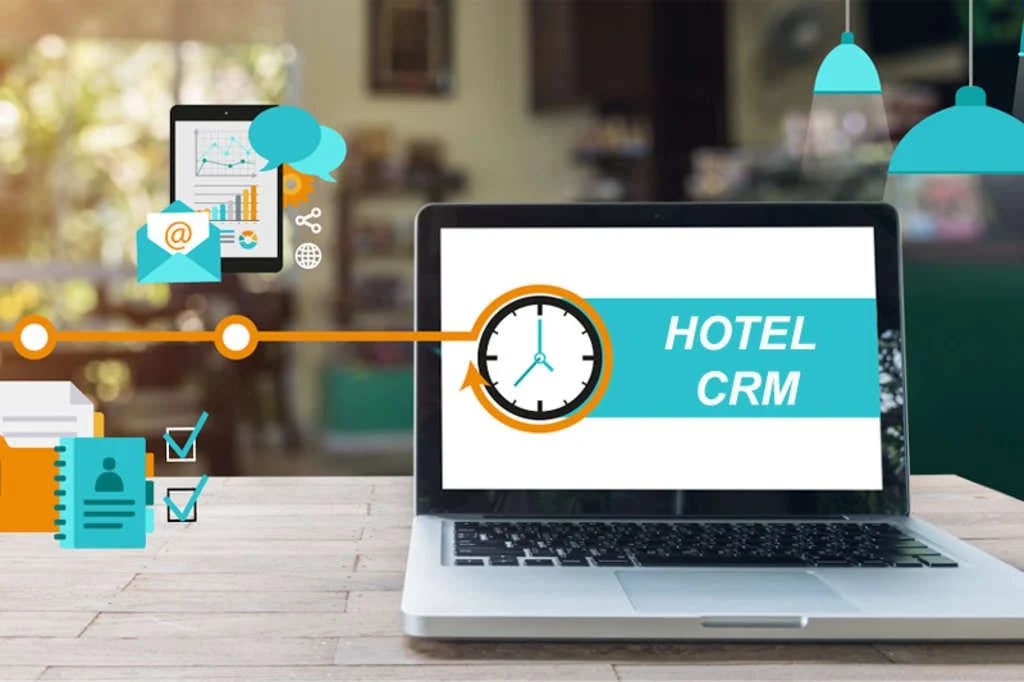
Specifics of selling B2C businesses:
- the most important thing to consider when organizing sales and advertising campaigns in this segment — purchases are made based on subjective desires, and rationality does not always prevail;
- the focus is on the needs of entire groups of people, not specific consumers. The offers are as universal as possible to reach the greatest possible number of potential buyers;
- successful advertising campaigns + good service are the main components of success in B2C sales. Competition in this segment is very high, so it is worth finding and qualitatively forming a successful UTP.
[Related Article: CRM for B2B And B2C: What it is & How is it Different?]
Hospitality CRM Software for Business to business clients (B2B)
An attentive and responsible approach to customers is a key point of growth in any business segment. Why is it so important in B2B? The fact is that the quality of service and customer loyalty of the buyer depends on the quality of service of the seller of business solutions. That is, any error or delay in processing your lead's requests can lead to the outflow of his audience.
And such consequences can be avoided thanks to the implementation of a CRM system, which allows you to centralize and quickly analyze any data and actions of your leads.
Therefore, in this article, we will pay attention to the main features of CRM from the user's point of view, find out what modern cloud CRM programs are capable of, and also look at their user ratings.
That is why, when choosing a CRM system for B2B, it is worth paying special attention to its capabilities for collecting and structuring the personal data of customers. You'll need tools for finding contacts, grouping leads, note fields, and deal status indicators.
And it is extremely important that the CRM in hospitality industry has a native channel for communication with leads and customers. It can be a tool for sending in messengers, e-mails, SMS, or in social networks.
In most cases, developers provide the opportunity to integrate CRM with other programs using an open API, but the downside of this approach is the low speed of operation and obtaining statistics.
Therefore, regardless of specialization, cost, and functional features, it is worth choosing a CRM system taking into account its ability to collect, store and structure information about customers. And do not forget to ask the developer what communication channels with leads are available directly from the software shell.
[Related Article: B2B CRM Software: All You Need to Know & Our TOP 10 List]
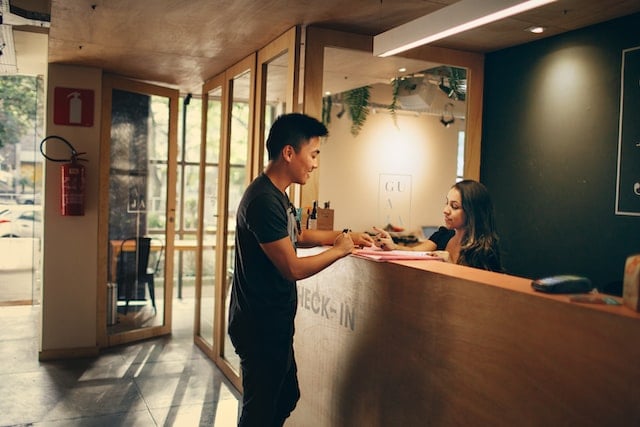
Which benefits is when use a CRM for Hotels
Information about hotel guests is collected in a single program (contacts, addresses, names, birthdays), with the possibility of its analysis and multi-stage use. CRM is now gaining more and more popularity as a tool to fight for a permanent client, as it allows you to analyze each user of the hotel - guests, companies, and travel agencies. All customer information is automatically transferred from PMS to CRM and becomes available for visualization and analysis.
The main advantages of CRM for the hotel operations are:
1) Tailored CRM Modules: Bridging the Gap Between Large Hotels and Boutique Hostels
A universal solution designed for use by large chain hotels and small hostels, the tailored CRM modules are being meticulously finalized to perfectly meet the unique needs and requirements of each individual business. Whether it's a sprawling luxury hotel or a cozy boutique hostel, these modules are specifically crafted to cater to the distinct demands of the hospitality industry.
By incorporating these modules into their operations, hotels and hostels can revolutionize their business processes and enhance their overall efficiency. With the introduction of automatic tools like chatbots for booking and round-the-clock online payment options, the system streamlines the entire reservation process, making it easier and more convenient for guests to book a room. Invoices can be generated instantly, simplifying and expediting the payment process.
One of the key advantages of these tailored CRM modules is the ability to solve the problem of multi-level communication. With a fixed manager assigned to each guest, all communication can be conducted seamlessly in one window, providing a cohesive and personalized experience for the guest. Guests can choose their preferred method of communication, whether it's via phone, email, or chat, and the manager will be readily available to assist.
Furthermore, these modules reduce the requirements for the qualification level of personnel. Employees no longer need to perform complex routine actions, as many tasks can be completed with a simple click of a button. This not only increases efficiency but also minimizes the risk of errors caused by human factors.
The CRM system also offers a range of key features that benefit hotels and hostels. Managers of the sales and marketing department have access to comprehensive data on customer solvency, confirmed bookings, and overnight stays. This allows them to calculate the average income from each client and tailor their strategies accordingly. The system also takes into account customer preferences and contract terms, enabling hotels to provide a highly personalized and exceptional level of service to their guests.
Moreover, the CRM system enables hotels to send targeted information about special offers, promotions, and events to guests who are most likely to be interested. It also facilitates the calculation of bonuses and the provision of discounts based on specific indicators. By leveraging these features, hotels can differentiate themselves from the competition and enhance their overall competitiveness in the market.
In today's competitive landscape, every guest expects to be served with the utmost quality and professionalism. Therefore, the importance of competent hospitality CRM software cannot be overstated. These tailored modules empower hotels and hostels to quickly analyze customer information, provide personalized service, and deliver exceptional experiences to every guest. By choosing the right CRM solution that aligns with their specific needs, hotels can optimize their operations, streamline their processes, and elevate their level of service.
2) Automating Success: Chatbots and 24/7 Payments Transforming Hotel Business Processes
In today's fast-paced and competitive hospitality industry, hotels are constantly looking for ways to streamline their business processes and provide exceptional customer service. One of the key ways they can achieve this is by leveraging automatic tools such as chatbots and round-the-clock online payment systems.
The development of business processes through the introduction of these automatic tools has revolutionized the way hotels operate. For example, the use of a chatbot for booking allows guests to easily make reservations at any time, without the need for human intervention. This not only saves time for both the hotel staff and the guests, but it also ensures a seamless and efficient booking process.
Similarly, the availability of round-the-clock online payment systems for hotel rooms has simplified and accelerated the payment format. Guests can now conveniently and securely make payments for their rooms instantly, without the need for manual invoicing. This not only reduces the risk of errors due to human factors but also provides a convenient payment option for guests, enhancing their overall experience.
Furthermore, the introduction of these automatic tools has also solved the problem of multi-level communication. With a fixed manager communicating with the guest in one window mode, guests can choose any convenient method of communication, whether it's through chat, email, or phone. This eliminates the need for guests to repeat their requests or concerns to multiple staff members, ensuring a more personalized and efficient service.
Moreover, the use of automatic tools reduces the requirements for the qualification level of personnel. Employees no longer need to perform complex routine actions, as some tasks can be closed with just a click of a button. This allows hotel staff to focus on more important and value-added tasks, such as providing personalized recommendations, resolving guest issues, and creating exceptional experiences.
Overall, the integration of chatbots and 24/7 online payment systems into hotel business processes has transformed the industry. It has simplified and accelerated processes, reduced costs, improved communication, and enhanced the overall guest experience. By embracing these automatic tools, hotels can differentiate themselves from the competition and stay ahead in today's highly competitive market.
3) Instant Invoicing for CRM for Hotels: Streamlining Payment for Faster Transactions
The introduction of simplified and accelerated payment formats in the hotel industry has revolutionized the way hotels invoice their clients. With the implementation of instant invoicing systems, hotels can now generate invoices and send them to clients instantly, eliminating the need for manual invoicing processes. This not only saves time for both the hotel staff and the guests but also ensures a seamless and efficient booking process.
The instant invoicing feature allows hotels to generate invoices as soon as a booking is confirmed, without any delays or manual intervention. This ensures that guests receive their invoices promptly, enabling them to make timely payments. Additionally, the automated invoicing process reduces the risk of errors caused by human factors, such as incorrect calculations or data entry mistakes.
By streamlining the payment format, hotels can provide a convenient and efficient payment option for their guests. With the availability of round-the-clock online payment systems, guests can conveniently and securely make payments for their rooms instantly, without the need for manual invoicing. This not only enhances the overall guest experience but also reduces the risk of payment delays or errors. Guests can now make payments at their convenience, anytime and anywhere, ensuring a seamless and hassle-free transaction process.
Furthermore, the simplified and accelerated payment format also benefits the hotel staff. With instant invoicing systems, employees no longer need to spend time manually generating invoices or dealing with payment-related tasks. This allows them to focus on more important and value-added tasks, such as providing personalized recommendations, resolving guest issues, and creating exceptional experiences. The reduced requirements for the qualification level of personnel also contribute to increased efficiency and productivity within the hotel staff.
In conclusion, the introduction of simplified and accelerated payment formats in the hotel industry has transformed the way hotels manage their invoicing and payment processes. The implementation of instant invoicing systems ensures that invoices are generated and sent to clients instantly, streamlining the booking process and enhancing the overall guest experience. By embracing these automated tools, hotels can save time, reduce costs, and provide a seamless and efficient payment experience for their guests.
and few more:- solving the problem of multi-level communication - a fixed manager will communicate with the guest in one window mode (at the same time, the guest can choose any convenient method of communication);
- reduced requirements for the qualification level of personnel - employees do not need to perform complex routine actions, some tasks are closed by clicking on the appropriate button;
- control by the system, excluding errors due to the fault of the human factor.
[Related Article: The Best Marketing Automation Software & Platform]
Key Features of Using Hotel CRM Software
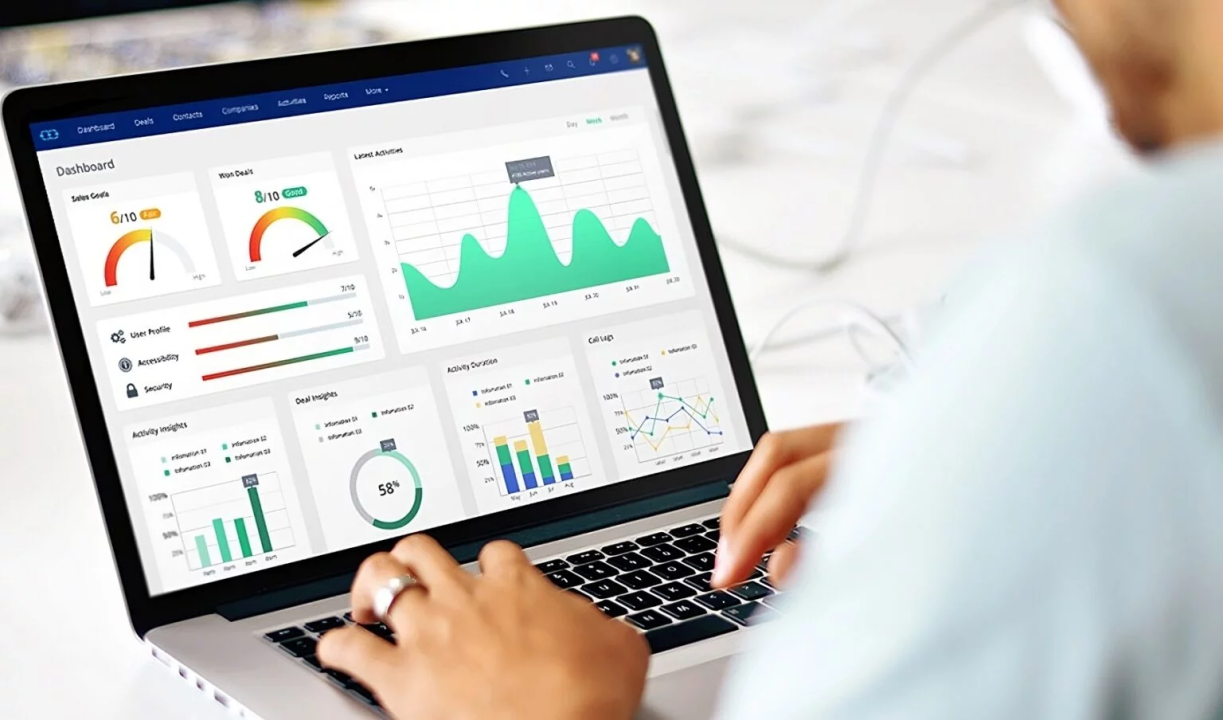
Managers of the sales and marketing department have the opportunity to view all data on the solvency of all their customers, as well as see information on the number of confirmed bookings and the number of overnight stays. Right here you can calculate the average income from one client and the tariff. In addition, it takes into account all the preferences and wishes of customers, and all the terms of the contract, this allows you to maximize the level of service that is provided to hotel customers.
The hotel can always send information about special offers and promotions to those guests from the database who might be interested in it, congratulate their guests on their birthday or any other holiday, and possibly notify them about ongoing events at the hotel. Calculate bonuses and provide discounts depending on certain indicators.
The CRM software for hospitality industry allows the hotel to stand out from the competition: quickly analyze information about customers, provide them with high-level service, offering a service to each guest personally, focusing on his features, requests, and preferences. Today every guest wants to be served qualitatively and professionally. That is why it is impossible to overestimate the importance of competent work with CRM systems today.
Thus, companies have the opportunity to choose those solutions that best suit them for the implementation of CRM processes.
The CRM system serves to solve the following tasks facing the company:
- Automation of sales and marketing processes;
- Pricing;
- Adaptation for clients;
- Confidence in the implementation of sales;
- Customer-focused sales process
The ideal CRM for a hotel is a system that simplifies the management of rooms, restaurants, laundry, and accounting. A benchmark service program that ensures teamwork and a high level of service.
CRM gives a certain benefit to hotels:
- Quick adaptation to market conditions. Companies have the ability to quickly change prices and add services.
- Reduced processing time for incoming calls.
- Reducing the cost of advertising (choosing the optimal channel of interaction with the audience, increasing the efficiency of spending money on advertising - reducing the advertising budget while maintaining the final effect), etc.
- Building relationships. Hotel owners can analyze the responses of their customers, getting additional information about them.
- Audience reach. You can count how many people visited the hotel site, and how many of them stopped at a certain place of this site.
Such information helps hotels to improve their offers and properly conduct advertising campaigns.
[Related Article: What are the functional & technical features of CRM software?]
The Best CRM Software for Hotels
- Pipedrive
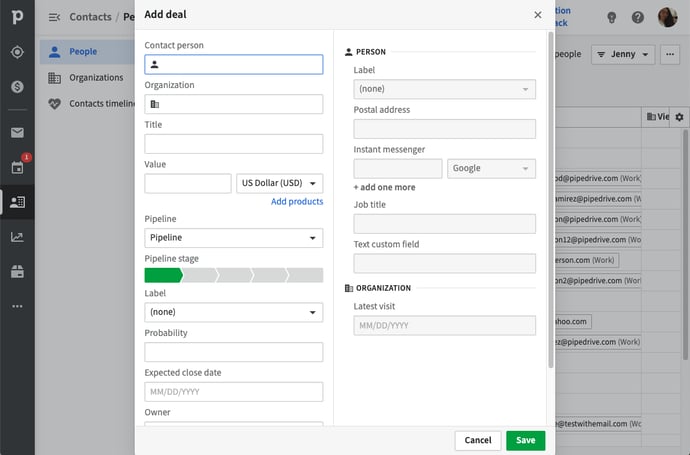
Pipedrive is a cloud-based project management platform popular with companies looking for a solution for their budget needs. It is easy to use and offers features that make it easy for teams from different departments to work together towards a common goal.
The main purpose of the app is to optimize how you spend your time communicating with customers. This best CRM software for hotels doesn't just save time. This ensures that you can further optimize your workflow.
The application analyzes the data you enter and determines exactly why you are losing customers. In addition, he gives some pointers on things you can improve to make your sales process a little more efficient.
Pros
- Intuitive interface
- Customization
- Task scheduling
- Tracking everything without exception
- Sales funnel
- Reports
- Forecasting
- Email integration
- Powerful API
- Data security
- Mobile applications
Cons
- There is still no functionality that separates irrelevant leads from new ones. You will have to manually review your contacts and delete old leads to separate them from new ones.
Pricing
The basic Pipedrive plan costs $12.50 per month. You can save up to 17% by subscribing for a year. Pipedrive prices are divided into four packages: Essential, Advanced, Professional, Power, and Enterprise. They cost $12.50, $24.90, $49.90, $59.90 and $74.90 respectively. To make sure the app is right for you, you can try it for free for 14 days.
- Zoho CRM
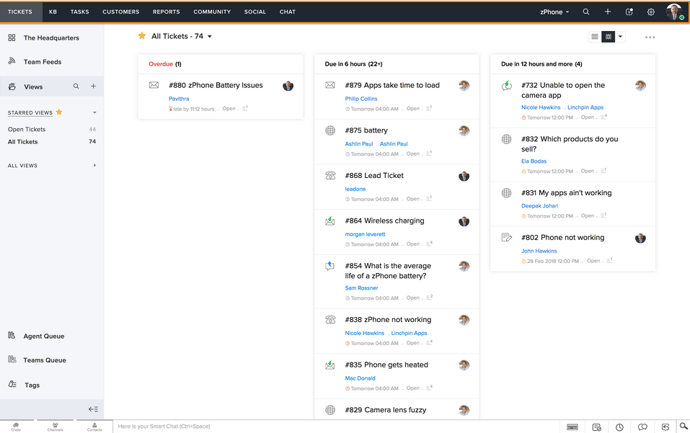
According to the style of doing business, Zoho is suitable for companies that want to quickly solve problems, rather than paint technical tasks, connect developers, and wait a long time until everything is set up. Therefore, customers who want responsiveness choose Zoho CRM.
The main application is Zoho CRM, a tool that helps you manage your sales process and automate your daily tasks. This frees up more time to focus on what really matters. Zoho CRM also helps you keep track of all the opportunities, and actions that are taken with each client, and take care of long-term relationships with customers.
The key feature of this best CRM software for hotels is multi-channel. Hotel managers can work with leads on the site, in social networks, in online chats, by phone, and via e-mail. A serious analytical unit of the system allows you to monitor the effectiveness of advertising investments, manage inventory, and monitor the cost part and payback rates.
Pros
- Many channels
- Collaboration
- Business Intelligence and Reporting
- Automation of all processes
- Social media integration
- Marketing Automation
- Customer support
- Data protection
- Records management
Cons
- Paid mobile access and imperfect interface on mobile devices. Limited ability to manage complex structures and sales department.
Pricing
Depending on your needs, you can choose the desired tariff:
- Free plan
- Standard: €14 per user per month, billed annually
- Professional: €23 per user per month, billed annually
- Enterprise: €40 per user per month, billed annually
- Ultimate: €52 per user per month, billed annually
- Microsoft Dynamics
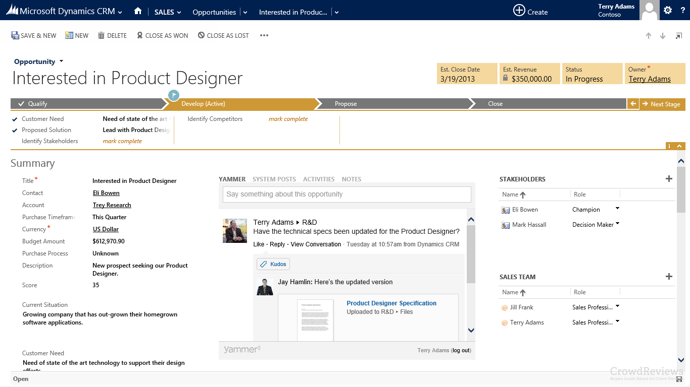
Microsoft Dynamics CRM is a system for project management and communication with clients. This is an advanced platform, access to the licensed system is installed through a browser, mobile phones, or a plug-in in Microsoft Outlook. Flexible configuration allows you to use the system in accordance with the unique goals of the company. You can work in the program based on cloud technologies; a local version on the server is also available.
The system initially consists of several categories: sales, customer support, marketing, reporting, and analytics. In the sales section, you can automate processes from an offer to processing a finished order, create customer profiles, and synchronize processes with a calendar. In marketing, campaign scenarios are developed, and customer cards are created, which can be classified by subject.
Pros
- Sales funnel
- Client base
- Order management
- Reports
- Mail Integration
- File storage
- Gantt Chart
- Billing and accounts
- Export/import data
- API for integration
- Web Forms
Cons
- Most likely, for the initial setup, you will need to hire a specialist. This is the only way you can hide all unnecessary fields, and get fully functional and convenient control and monitoring panels.
Pricing
Microsoft Dynamics 365 offers a lot of custom options and add-ons. Prices range from $20 per user per month and go up to $1,500 per tenant per month.
Read a Detailed Microsoft Dynamics 365 Overview
- Revinate
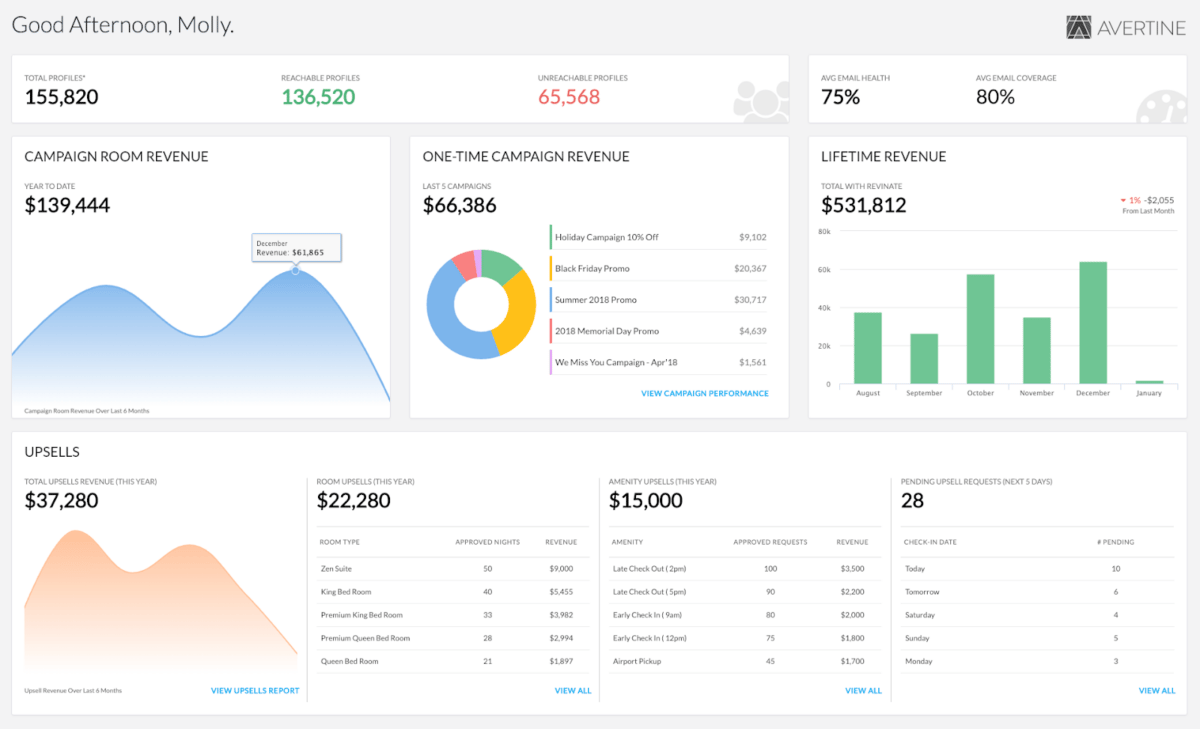
Revinate's comprehensive guest profiles encompass various booking methods, the total number of stays and nights, the overall amount spent, the duration since their last stay, upsell requests, special preferences, and even guest data from other CRM and PMS platforms.
The platform also excels in robust reputation management, gathering and analyzing reviews from Google, TripAdvisor, social media platforms, and numerous other sites.
Furthermore, this best CRM software for hotels offers valuable guest feedback and survey forms, allowing for in-depth insights into the customer experience.
With its marketing campaign modules, the platform enables the creation, sending, and management of campaigns for multiple hotel locations, ensuring a unified brand messaging approach.
In addition, Revinate's performance tracking feature empowers hoteliers to compare booking rates and customer satisfaction data across multiple branches and locations.
Pros
- Marketing CRM
- Marketing automation
- Template builder
- Guest profiles
- Segmentation
- Privacy and compliance
- Data management
- Guest feedback management
- Reputation management features
- Integrations
- Analytics and reporting
Cons
-
It could use more robust lead scoring to track prospective customers who have entered the pipeline but are not yet ready to book a stay.
-
There is no real service module that can handle customer inquiries and tickets over the phone.
Pricing
-
Contact Revinate to request pricing
- NetSuite CRM
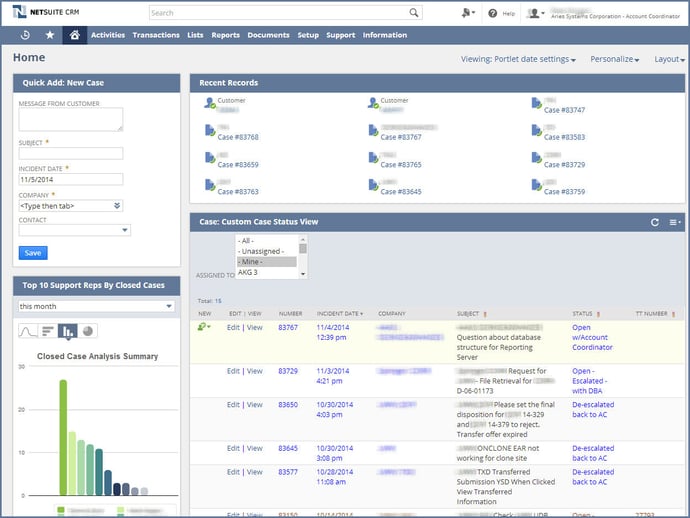
NetSuite ERP is a comprehensive and scalable cloud-based ERP solution for medium and fast-growing businesses. Automates back office processes including financial management, capital assets, revenue management, order management, invoicing, and more.
This application offers many benefits, including increased employee productivity through cross-departmental systems integration and software automation. It provides real-time data transparency for smarter decision-making. NetSuite consists of seven interconnected modules, each of which retrieves data from a common database. This relationship provides users with certain features of the module.
Pros
- Financial management
- Enterprise resource planning
- Business Service Automation
- MIT Marketing
- Business data analysis
- Order Management
- Price management
Cons
- Basic support is limited, and additional support comes at an extra cost.
Pricing
NetSuite pricing is custom for every customer.
Read a Detailed NetSuite CRM Overview
- Experience CRM
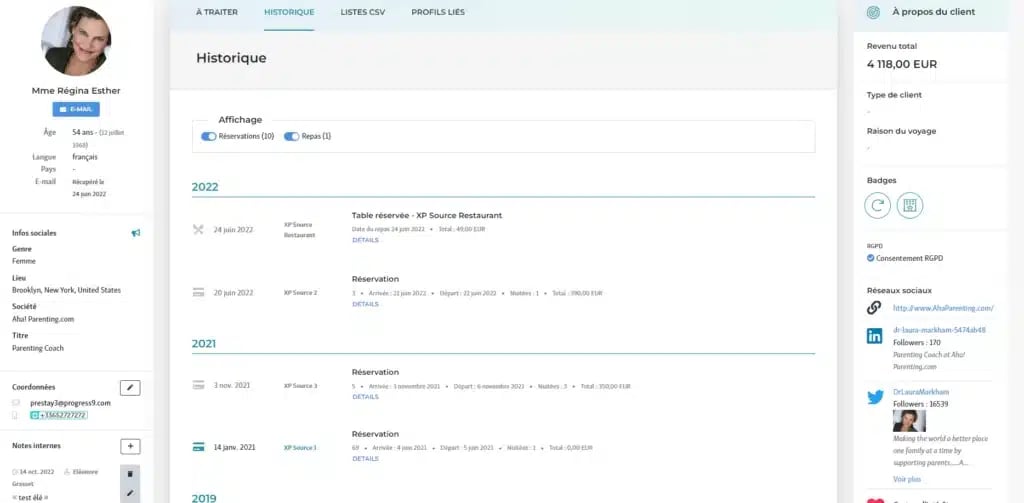
Experience CRM is a cutting-edge hotel CRM software designed for hotels to enhance customer loyalty and deliver exceptional experiences throughout every stage of a guest's stay. With its specialized concierge tools, hotels can effortlessly execute upsell campaigns, offering enticing deals on restaurant meals, luxurious spa treatments, and room upgrades.
The software also incorporates unobtrusive surveys strategically placed during a guest's stay, allowing hotel staff to proactively address any concerns before they escalate into complaints. Moreover, this CRM for hotel management offers comprehensive segmentation features that enable hotels to create targeted campaigns for prospective guests based on factors such as nationality, age, interests, and familiarity with the hotel's regional location.
Additionally, the software provides easy-to-use re-booking tools that are seamlessly integrated with the hotel brand, eliminating the need for third-party commissions when welcoming back returning guests. With Experience CRM, hotels can elevate their guest experience and foster long-lasting customer loyalty.
Pros
- Customer database
- Customer journey
- segmentation
- E-reputation
- Email campaigns
- Hotel group
Cons
-
This tool for hotels lacks stronger integration with PMS interfaces.
-
While there is good automation regarding notifications, it could use more marketing automation in their email campaigns.
Pricing
- GUEST RELATION: 130€ per month
- ALL-IN-ONE: 210€ per month
- MARKETING: 105€ per month
- Keap
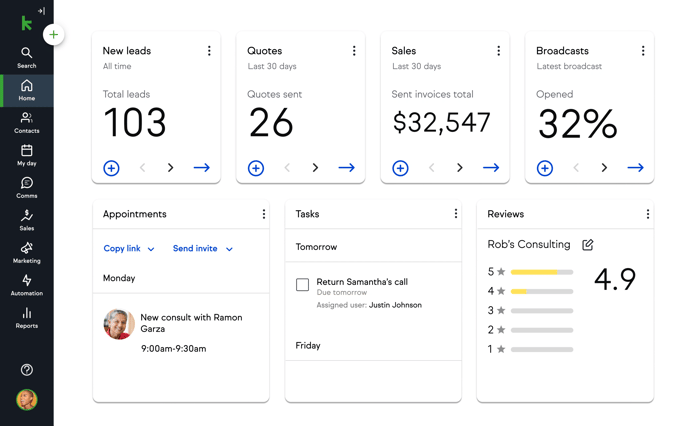
Keap is a comprehensive CRM, sales and marketing automation software that helps you organize leads, find jobs, get paid, and keep growing.
Automated data collection: Keap's internal CRM forms use automation so you can quickly and easily add new leads to your ever-growing list without doing any extra work.
Your emails will be more effective if you personalize them with one of Keap's many email templates available.
Using this best CRM for hotels, you can access a complete history of communication with potential clients and clients. This includes emails, discussions, quotes, payments, and meetings with both parties.
Pros
- Marketing automation
- Sales automation
- Payments and invoicing
- Email and text messaging
- Appointments and scheduling
- Lead capture and pipeline
- Reporting and analytics
- Dedicated business phone line
- Integrations
Cons
- This CRM for hospitality industry will mark a contact as opted out if it does not appear actively engaged.
- To fully utilize the program's features, a significant time commitment is required to study each module and tool.
- More tutorials/guides and onboarding training for users is needed.
Pricing
Keap CRM has three pricing options: the Keap Pro plan is $159 per month, the Keap Max plan is $229 per month, and the Keap Ultimate plan is $279 per month. Additional users are $29 per month, with a 14-day free trial.
- Salesforce
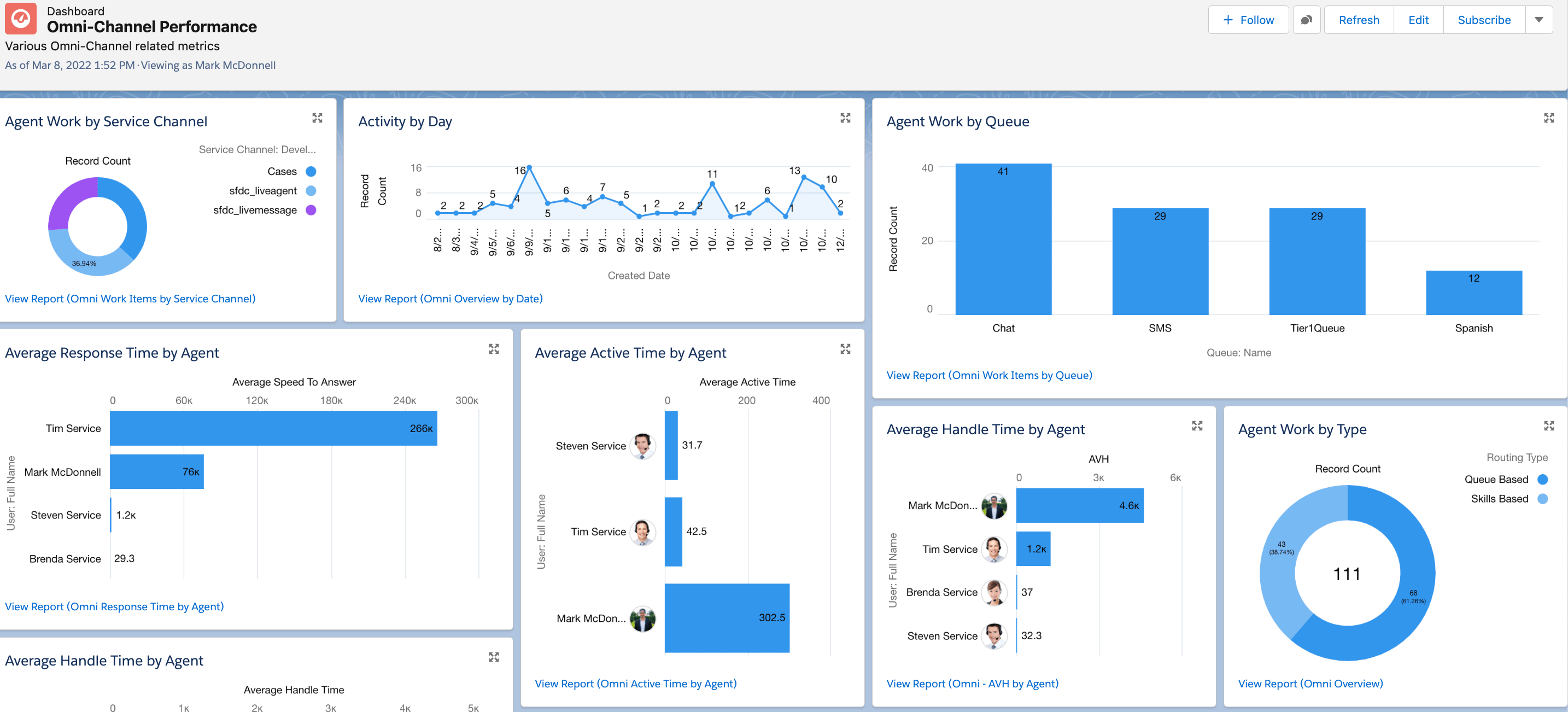
Salesforce is a dynamic CRM tool renowned for its extensive range of features tailored to different industries, such as the hospitality sector. For hotels seeking to grow and streamline their operations, this hotel sales software is a powerful solution.
Within Salesforce, hotels can access a plethora of CRM capabilities, spanning from guest profiles to managing sales pipelines and conducting thorough analyses of customer journeys.
Its versatile modules empower hotels to oversee various aspects, including check-in procedures and email marketing campaigns, resulting in enhanced guest satisfaction.
Pros
- Customizable CRM
- Sales Cloud
- Service Cloud
- Marketing automation
- Analytics and reporting
- Integration capabilities
- Collaboration tools
- AppExchange
- Scalability and security
Cons
- It might take a bit longer for beginners to learn to use it.
- This hotel CRM can be pricier compared to certain specialized CRM tools.
- Certain functions might be overwhelming for smaller businesses.
Pricing
Salesforce Sales Cloud:
- Starter Suite: $25 per user per month, billed annually
- Professional: $80 per user per month, billed annually
- Enterprise: $165 per user per month, billed annually
- Unlimited: $330 per user per month, billed annually
- Einstein 1 Sales: $500 per user per month, billed annually
Read a Detailed Salesforce Overview
- monday sales CRM
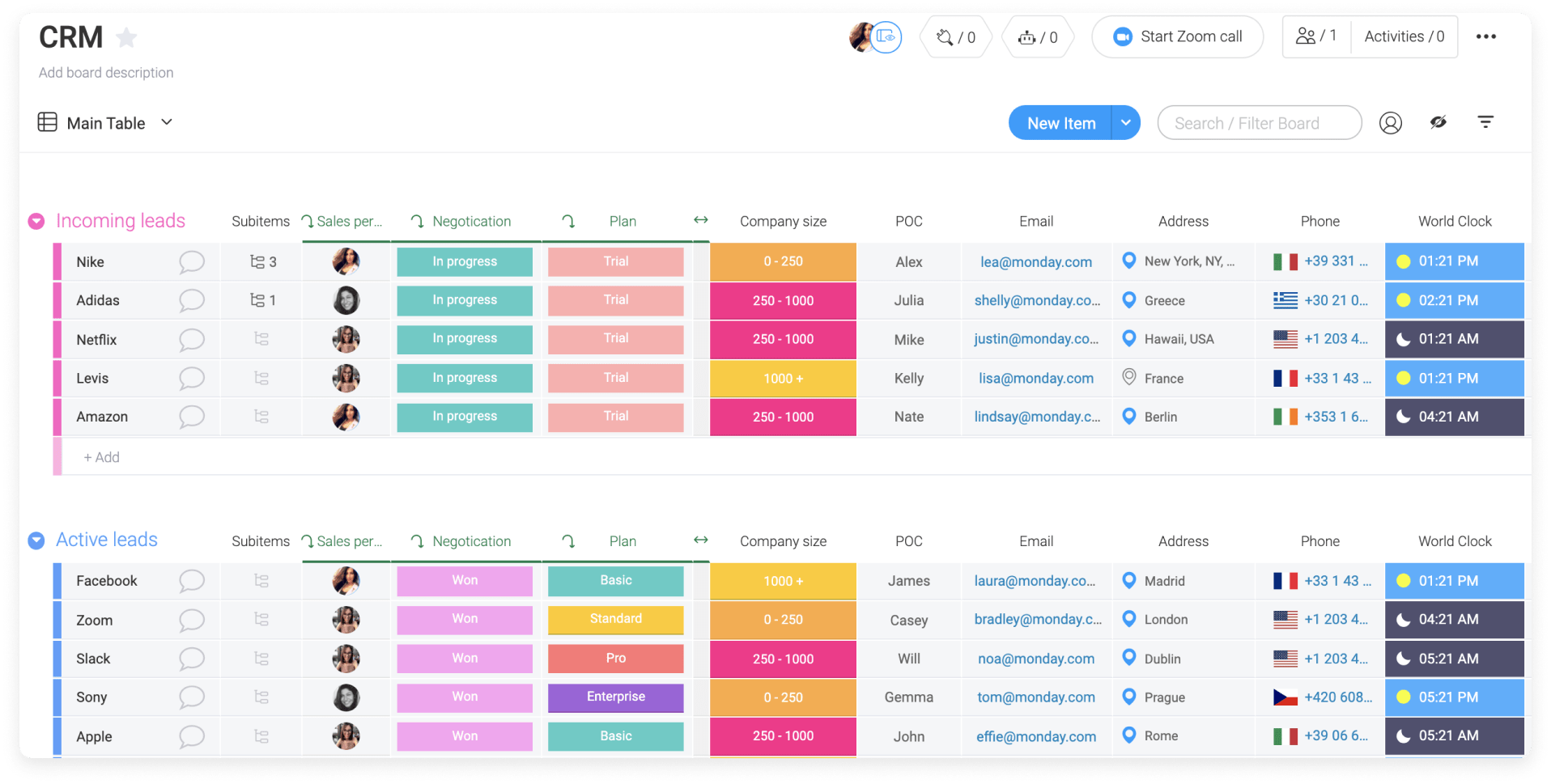
monday sales CRM is designed to boost the efficiency of sales teams in the hospitality industry. Focused on fostering teamwork and streamlining sales efforts, it's the perfect fit for businesses aiming for a cohesive approach to sales management.
This hotel CRM software excels with its specialized modules for real-time collaboration, lead tracking, and contact management, empowering teams to stay on top of potential customers.
Its CRM functionalities are enhanced by intuitive workflow tools and valuable insights into the sales pipeline. When it comes to compatibility, monday seamlessly integrates with popular email campaign platforms like Pipedrive and Freshsales, as well as other CRM systems, making it even more attractive to businesses looking to optimize their processes.
Pros
- Real-time collaboration
- Lead management
- Contact management
- Workflow tools
- Sales pipeline insights
- Integrations
- Customization options
- Mobile accessibility
- Reporting and analytics
Cons
- New users might face a learning curve when adapting to this collaborative CRM.
- The extensive array of features could overwhelm smaller teams.
- Pricing may pose a challenge for businesses with limited budgets.
Pricing
- Basic CRM: €12 per seat per month, billed annually
- Standard CRM: €17 per seat per month, billed annually
- Pro CRM: €28 per seat per month, billed annually
- Enterprise CRM: contact the vendor
Read a Detailed monday sales CRM Overview
- Hubspot
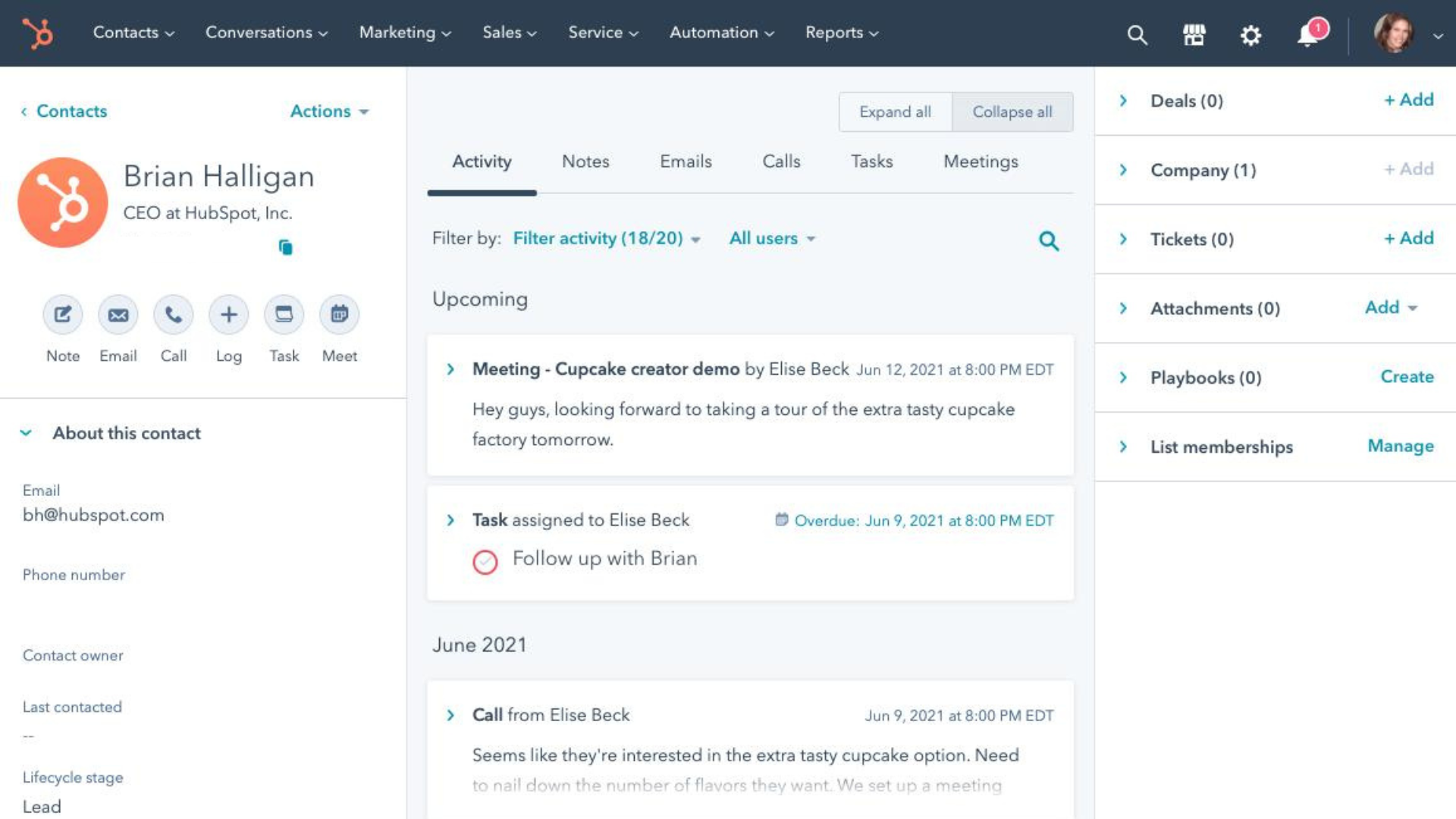
Hubspot, a renowned frontrunner in the CRM field, excels in revolutionizing customer engagement with its inbound marketing strategies. Particularly for the hospitality sector aiming to captivate and interact with potential clients, Hubspot is the basis for establishing meaningful connections.
With remarkable features like marketing automation, contact organization, and segmentation, Hubspot simplifies the customer experience journey, empowering hospitality enterprises to tailor interactions effortlessly. Moreover, this hotel CRM system seamlessly integrates with different tools, and diverse property management systems, amplifying its effectiveness.
Pros
- Inbound marketing
- Marketing automation
- Contact management
- Segmentation
- Integrations
- Personalization tools
- Analytics and reporting
- Scalability
Cons
- The extensive array of features may require time to master, potentially presenting a learning curve.
- Access to certain advanced features is limited to higher-priced tiers.
Pricing
- Free plan
- Sales Hub Starter: $50 per month
- Sales Hub Professional: $450 per month
- Sales Hub Enterprise: $1,500 per month
Read a Detailed HubSpot CRM Overview
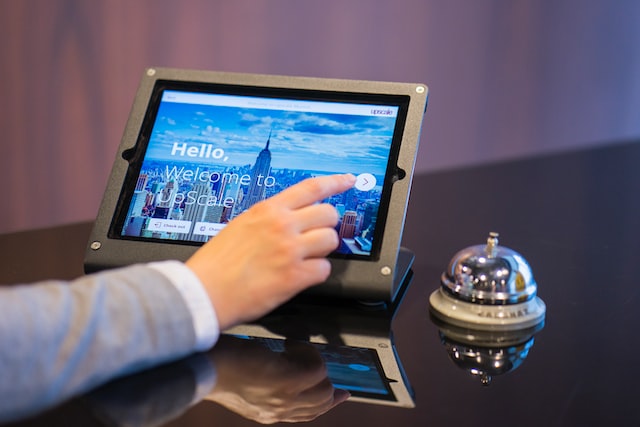
What you should look for when choosing a CRM for your Hotel
CRM can be used not only for the hotel. It can be adapted to the needs of people's accommodation businesses with additional features for different areas. Choosingtiring with so many options at your disposal with so many options at your disposal. Let'ssome notable examples and how you can choose the right tool for your small business needs.
So, when looking for a CRM for your hotel business, be sure to pay attention to the following additional features:
- room service management module;
- monitoring the performance of individual employees;
- product catalog;
- integration with the site, mail, telephony, and messengers;
- helpful story information for personnel training (handbook) - job instructions, advice, behavior algorithms;
- integration with registrars of settlement operations (cash registers);
- mobile application for employees and customers.
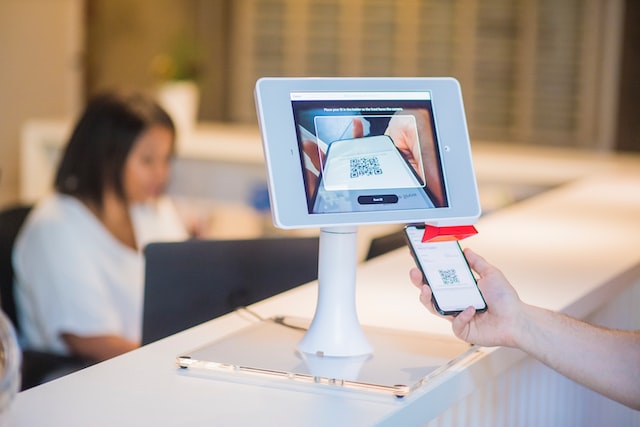
Summary
Thus, CRM makes it possible to move to a qualitatively new level of relations between a hotel company and customers and suppliers. At the moment, the interaction of a hotel company with customers and suppliers via the Internet is the most technically and economically convenient Therefore; it is possible for wide application.
Do you want to take your hotel business to the next level? We are ready to provide you with professional advice, recommend the best approaches and technologies, conduct a business analysis, and implement a highly valuable system in your business.
FAQ When Choosing the Best CRM for the Hospitality Industry
What software do hotels use?
Hotels typically use a range of software solutions to manage various aspects of their operations. Common programs used by hotels include property management systems (PMS), customer relationship management (CRM) software, revenue management systems, and booking engines.
What CRM does Hilton use?
Hilton uses a proprietary CRM system developed in-house to manage customer relationships and guest interactions across its portfolio of hotels and resorts. This CRM system is tailored to Hilton's specific needs and requirements, allowing the company to provide personalized experiences and services to its guests. It has efficient CRM strategies like “Customer Really Matters” and “OnQ”.
How do I know which CRM to use?
When selecting a CRM system for your hotel or hospitality business, consider factors such as your specific business requirements, budget, integration capabilities with existing systems, ease of use, scalability, and customer support. It's essential to evaluate multiple CRM options, conduct thorough research, and possibly even trial different solutions before making a decision.
What are the 3 essential components of Best Hotel CRM?
The three essential components of the best hotel CRM systems typically include:
- Guest profile management: Comprehensive guest profiles containing detailed information such as preferences, stay history, special requests, and contact details.
- Reservation and booking management: Efficient management of reservations, bookings, room allocations, and availability across various channels, ensuring a seamless booking experience for guests.
- Marketing and communication tools: Tools for personalized marketing campaigns, targeted promotions, email automation, and guest communication, enabling hotels to engage with guests and build lasting relationships.
